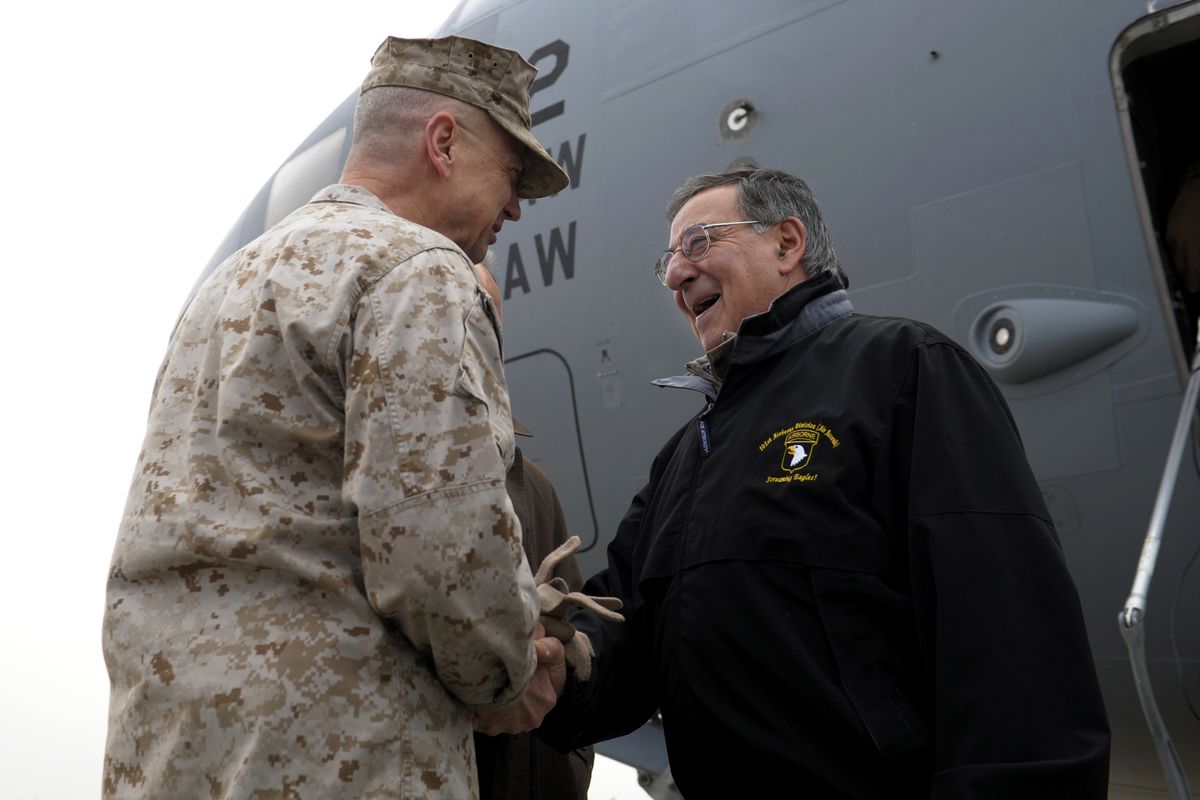Panetta in Afghanistan to meet with Karzai

KABUL, Afghanistan (AP) — President Barack Obama will decide shortly how many U.S. troops he wants to keep in Afghanistan after the U.S.-led coalition military mission ends in December 2014, Defense Secretary Leon Panetta said Wednesday as he opened two days of consultations with top U.S. commanders and Afghan President Hamid Karzai.
Panetta offered no clues to what Obama may decide, but other officials have indicated the White House is considering plans that call for between 6,000 and 10,000 U.S. troops to stay for several years after 2014 in order to keep Afghanistan on a path toward stability and to prevent al-Qaida and affiliated terrorist groups from re-emerging as a significant force here. The U.S. now has about 66,000 troops here, along with about 35,000 from allied nations.
Obama also must decide how quickly to reduce the U.S. force from 66,000 to whatever post-2014 level he deems necessary and Karzai considers acceptable.
White House officials said the president’s decision on both matters was not expected before the end of the year. His announcement could be timed to a meeting with Karzai in Washington early in 2013. The Afghan leader said last month that he had accepted Obama’s invitation to visit the White House “at his earliest convenience.”
Panetta had dinner with Gen. John Allen, the top coalition commander, as well as other senior commanders, and he was scheduled to meet with Karzai on Thursday.
Allen, who is under investigation by the Pentagon’s inspector general for possibly inappropriate correspondence with a Florida woman linked to the David Petraeus sex scandal, met Panetta upon his arrival at the Kabul airport. Allen did not talk to reporters.
Before the dinner, Panetta had a one-hour meeting with Allen and other senior military officers. Panetta told the commanders he would be meeting with Afghan leaders to “try to tee up” the decisions Obama will have to make on future U.S. troop levels, according to media in the room before the meeting started.
Obama is currently reviewing options for what the U.S. mission might look like after 2014. But the White House has not yet asked the Pentagon for proposals on the next phase of the drawdown in 2013.
Panetta’s visit comes at a difficult juncture in the Western coalition’s efforts to shift more security responsibilities to Afghan forces so the combat mission can end without a Taliban resurgence. While security has generally improved this year, Afghan forces still lack some important capabilities and the government’s ability to effectively govern beyond Kabul and to root out corruption is in great doubt.
Maj. Gen. Lawrence Nicholson, the coalition’s deputy chief of staff for operations, said in an interview with reporters traveling with Panetta that coalition commanders are pushing the Afghans to do more on their own. The idea is to push them “right to the brink of failure” so that they are ready to handle the Taliban once they no longer have large numbers of international troops to support them.
“What we say is we want them to see failure, we want them to smell it, we want them to taste it, we just don’t want them to achieve it,” Nicholson said. “We will push them as far as we can to be self-sufficient.”
Painting an optimistic picture, Nicholson said the effort to develop capable Afghan forces has evolved from an arrangement in which most combat operations were partnered or conducted with Afghan and coalition forces fighting together to one in which the U.S. and allied troops are merely “enabling” the Afghans by providing support, such as medical evacuation of their wounded as well as artillery support, bomb disposal and equipment to clear roads of homemade bombs.
The idea, Nicholson said, is to make the Afghan army and police almost entirely self-sufficient by the time the U.S. and NATO combat mission ends at the end of 2014.
“These guys are good fighters, they’re natural fighters. What they’re not good at right now is what we’re working with — these enablers,” he said.
Before flying to Afghanistan, Panetta spoke to about 100 U.S. service members inside an aircraft hangar at Ali al-Salem Air Base in Kuwait. He thanked them for their service and emphasized that the U.S. is winding down its involvement in lengthy wars.
_
Associated Press writer Julie Pace in Washington contributed to this report.